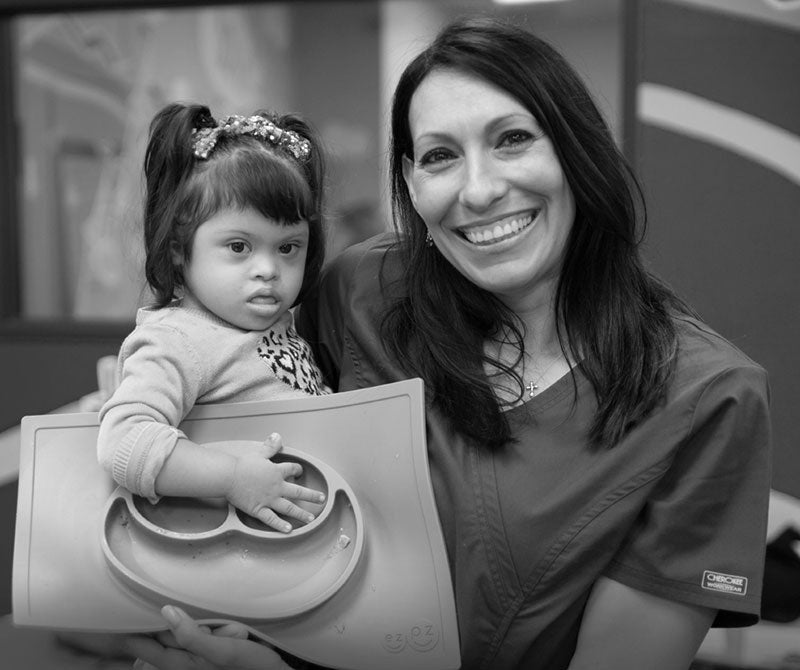Feeding Milestones for Baby: Spoon Feeding (6 to 12 months)
It’s important to be flexible in feeding. You may want to introduce your baby to solids using a specific feeding method (Baby Led Weaning (BLW) or Purees), but ultimately baby will choose what texture to eat and what texture to refuse. With this in mind, choose a spoon that will work for BOTH feeding methods. This saves you money (by not having to buy several different spoons) and will help baby easily transition from one texture to the next without spoon confusion. Here is how the ezpz Tiny Spoon can help with feeding skills like dipping and scooping.
Dip + Scoop: Some spoons are designed for dipping and others are designed for scooping. Choosing a spoon that can do both makes it easier for babies to learn to eat independently. The Tiny Spoon is perfect for dipping as the spoon has sensory bumps that will hold onto purees. And the angled spoon bowl makes scooping up food easy for early learners. Some babies will develop spoon skills earlier than others and we want to be ready for these little Einsteins!
Introducing Dipping: This stage in spoon-feeding is important for baby to learn about feeding independence. Dipping usually begins around 9 months of age, but I often see 6-month-old babies master this skill if they have the opportunity to try it! Here is some advice on teaching your little one the art of dipping:
- Preload Spoon: First you want to dip the spoon into the food and hand baby the spoon. If baby is ready for solids, baby will grab ahold of the spoon and start the hand-to-mouth movements of feeding. Continue to preload the spoon with food, showing baby how you are dunking the spoon (not scooping). Don’t be surprised if baby wants to do this motion with you. You can have baby hold on to your hand while you dip or you can hold on to the spoon and do it together!
- Practice: After you have worked on preloading the spoon for a few meals, place the spoon into the bowl of food and leave the spoon in there for baby to grab. When baby grabs the dipped spoon, eats it, and then re-dips it for more you have an independent dipper! If baby cries, becomes frustrated or does not grab the dipped spoon, just continue with preloading the spoon and handing it to baby. Don’t worry; your little one will let you know when they are ready to do the dipping themselves.
Introduce Scooping: The next stage in spoon-feeding is scooping. This skill usually begins a few months after baby starts dipping. Developmentally, this occurs anywhere between 11-18 months of age, but again I’ve seen babies as young as 8 months of age scoop easily when they have the right spoon! Here are tips for teaching baby how to scoop:
- Bowl: The key to developing the scooping skill is having the right bowl. I like to use the Tiny Bowl in feeding therapy, as it suctions to the table (or highchair tray) and makes it easier for baby to be successful. Baby can focus on using the spoon with their dominant hand while using their non-dominant hand to hold on to the edge of the Tiny Bowl. That means improved balance and safety!
- Repetition: Position yourself behind baby and practice my hand-under-hand (having your hand under baby’s hand to gently guide the spoon) scooping technique. At first, you may be doing all the scooping, but after a couple of turns, baby will happily take over! If baby doesn’t get it the first time around, it’s okay; repetition and having fun is key.
- Mess-Free Meals: Mess-free spoon-feeding doesn’t occur until around 18 months, so be patient during this scooping process. Products like the Tiny Bowl and Mini Mat will help keep the mealtime mess to a minimum while you endure the wait!
Want baby to look chic for your mealtime pics? Snag a matching Tiny Set (the Tiny Spoon, Cup, and Bowl in our stylish colors)! Show off your color preference by using our hashtags #ezpzfun #tinyspoons.
Happy Feeding!
Dawn Winkelmann, M.S, CCC-SLP
SPEECH LANGUAGE PATHOLOGIST & FEEDING SPECIALIST FOR EZPZ
Dawn Winkelmann, a.k.a “Ms. Dawn”, has treated thousands of kids across the globe by helping families overcome picky eating stages and food refusals, while adding new foods into their diet. Her high success rate is attributed to Ms. Dawn bringing her education, experience, sense of humor and her favorite feeding products to the family dinner table.
You will find Ms. Dawn’s expert feeding advice to be positive and fun for the entire family! She adapts complicated feeding/swallowing research and makes it practical and easy for parents! Get ready to learn the science behind your favorite feeding products and ways to bring happy family mealtimes back!



